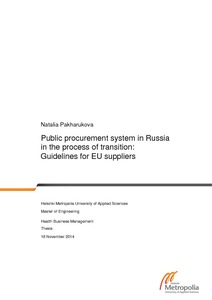Public procurement system in Russia in the process of transition: Guidelines for EU suppliers
Pakharukova, Natalia (2014)
Pakharukova, Natalia
Metropolia Ammattikorkeakoulu
2014
All rights reserved
Julkaisun pysyvä osoite on
https://urn.fi/URN:NBN:fi:amk-2014112817446
https://urn.fi/URN:NBN:fi:amk-2014112817446
Tiivistelmä
Significant size of the market, growing economy and increased investments in healthcare system makes Russia a promising trade area for EU-suppliers from related industries. Unfortunately, public procurement market in Russia has always represented a big challenge for foreign producers due to government bureaucracy, complex regulatory requirements and lack of transparency.
The purpose of this research is to identify key factors for success of foreign suppliers in the Russian state procurement market. To achieve this goal an extended amount of literature from both Russian and foreign sources has been reviewed and 10 interviews with representatives from procuring organizations, supplying and consulting companies have been conducted. Based on interviews' data, the main problems of procurement system have been identified. They include uneven financing of state organizations throughout the year, opportunistic behaviour of suppliers, lack of planning of state purchases and low level of transparency. Introduction of new procurement legislation (44-FZ) and its impact on effectiveness of procurement and position of foreign supplier has also been extensively discussed throughout the thesis. Currently, respondents have different attitudes towards new legislation: some interviewees believe that it will improve transparency by launching integrated procurement platform and implementing effective control and planning, while some respondents assume that new law will not bring any radical changes and only increase bureaucracy.
Analysis of existing pitfalls of public procurement and relevant recommendations of experienced representatives from state organizations and private companies enabled development of guidelines for foreign suppliers. Defining company strategy is a starting point for any EU-supplier entering the Russian market. Thorough marketing research has to be per-formed in order to identify local equivalents of the products offered. Findings of the study reveal the utmost importance of building relationships with customers and partners. Careful planning of tenders cannot be neglected. Tender documentation has to highlight and explain the key benefits of the offer for the Customer. Results of the study have also demonstrated that good after-sales service will add significant value to the proposal. Profound knowledge of legislation and experienced team of procurement professionals are other key factors for success in public procurement.
The purpose of this research is to identify key factors for success of foreign suppliers in the Russian state procurement market. To achieve this goal an extended amount of literature from both Russian and foreign sources has been reviewed and 10 interviews with representatives from procuring organizations, supplying and consulting companies have been conducted. Based on interviews' data, the main problems of procurement system have been identified. They include uneven financing of state organizations throughout the year, opportunistic behaviour of suppliers, lack of planning of state purchases and low level of transparency. Introduction of new procurement legislation (44-FZ) and its impact on effectiveness of procurement and position of foreign supplier has also been extensively discussed throughout the thesis. Currently, respondents have different attitudes towards new legislation: some interviewees believe that it will improve transparency by launching integrated procurement platform and implementing effective control and planning, while some respondents assume that new law will not bring any radical changes and only increase bureaucracy.
Analysis of existing pitfalls of public procurement and relevant recommendations of experienced representatives from state organizations and private companies enabled development of guidelines for foreign suppliers. Defining company strategy is a starting point for any EU-supplier entering the Russian market. Thorough marketing research has to be per-formed in order to identify local equivalents of the products offered. Findings of the study reveal the utmost importance of building relationships with customers and partners. Careful planning of tenders cannot be neglected. Tender documentation has to highlight and explain the key benefits of the offer for the Customer. Results of the study have also demonstrated that good after-sales service will add significant value to the proposal. Profound knowledge of legislation and experienced team of procurement professionals are other key factors for success in public procurement.
